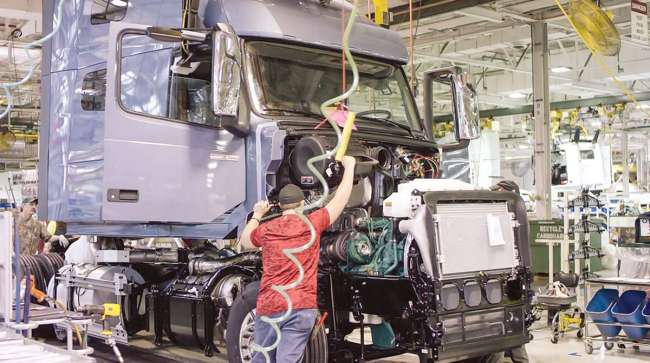Production at Volvo Trucks North America’s New River Valley assembly plant in Dublin, Va. It is the largest Volvo Group manufacturing plant in the world. (Volvo Group)
As many as 350 staff will be laid off in early April at Volvo Trucks North America’s New River Valley assembly plant in Dublin, Va., a Volvo Group representative told Transport Topics on March 28.
Between 250 and 350 members of the manufacturing team at the facility, the largest Volvo Group manufacturing plant in the world, will be let go indefinitely, the representative said in an email.
“This is due to reduced demand, particularly in our core longhaul segment, and because we are now past the critical phase in the ramp-up of our all-new VNL model,” the spokeswoman said.
New River Valley will continue to operate two shifts after the layoffs, she said, adding that the current head count at the recently expanded plant is about 3,600 staff.
A further 40 employees at Volvo Group’s Hagerstown, Md., powertrain plant were laid off March 21, the spokeswoman said. The staff were part of the team that manufactures engines, transmissions and axles for VTNA and sister company Mack Trucks.
VTNA began serial production of its redesigned Class 8 flagship VNL tractor at the 2.3 million-square-foot New River Valley plant in early October. VTNA opened the order book for the VNL last April.

Voorhoeve
New River Valley underwent $400 million in upgrades ahead of the start of production of the revamped VNL, which was launched in January 2024.
VTNA President Peter Voorhoeve termed the first major overhaul of the VNL since a 2017 redesign “a quantum leap forward,” adding that it was VTNA’s most significant launch since 1996.
New River Valley also will produce the latest iteration of the VNR regional-haul tractor. VTNA unveiled the first large-scale overhaul of the VNR on March 10 at American Trucking Associations’ Technology & Maintenance Council Annual Meeting, proclaiming a 90% redesign of the tractor including a tighter turning radius for navigating urban routes.

Volvo Trucks North America’s New River Valley assembly plant in Dublin, Va., which has about 3,600 staff. (Volvo Trucks North America)
More than 80% of the New River Valley workforce was represented by the United Auto Workers Local 2069 when a six-year labor deal was struck in 2021.
Local 2069 officials did not return a request for comment March 28, but the layoffs seem to have been expected, according to union communications with members.

Burnette
“The [layoffs are] really no surprise to most of us,” Local 2069 Hourly Bargaining Chair Tony Burnette wrote in a March 21 publication, UAW Pulse. “With the downturn in the market and economy, we will face many more challenges ahead.”
“We have had a severe downturn in orders, which seems to be industrywide, but we also have several issues with our new product that need to be corrected so that it would be more attractive to future buyers as well, including weight, cost, programming, etc.,” Salary Bargaining Chair Bill Richardson added in the same publication.
A decrease in truck sales in North America and Europe plus increased production costs in the U.S. dragged on Volvo Group profit in the fourth quarter of 2024, the company said Jan. 29.
Volvo Group posted a profit of $983 million in the most recent quarter, down 10.5% compared with $1.1 billion a year earlier. All Volvo financial data are reported in Swedish kronor, and dollar conversions were correct as of Jan. 29.
VTNA sold 6,448 trucks in Q4, down 19% compared with 7,964 trucks in the year-ago period.
Nick Darman of Alvys discusses the evolution of transportation management systems and workflow automation, while David Bell of CloneOps.ai shares insights from the Manifest 2025 supply chain innovation conference. Tune in above or by going to RoadSigns.ttnews.com.
Part of that decline at VTNA was the result of slower-than-expected production. The cost of manufacturing also rose for the same underlying reason, hurting the parent company’s bottom line.
Costs were higher than expected because of Hurricane Helene’s impact on supply chains in western North Carolina, the continued ramp-up of the VNL and reintegration of Mack Trucks’ cab assembly operations, CEO Martin Lundstedt said during an analyst conference call. Lundstedt said the additional costs were not unexpected with the VNL.
“When you are doing these big launches, of course, you need to plan for double production and also resilience in the system,” he said. “We are expecting that to fade out.”
The VNL and VNR redesigns — plus the upcoming launch of a flagship Mack Trucks on-highway tractor — are part of Volvo Group’s plans to seize a 25% North American heavy-duty truck market share by 2030.
VTNA won a 10.2% share of U.S. Class 8 retail sales in 2024, while Mack Trucks captured a 6.9% share, according to Wards Intelligence data. In 2023, VTNA had a 10% slice of the pie, and Mack Trucks 6.8%.
“The untapped potential is huge in North America, and we have all the possibilities to make this happen now,” company President Roger Alm told analysts during Volvo Group’s Nov. 14 Capital Markets Day in Dublin.







